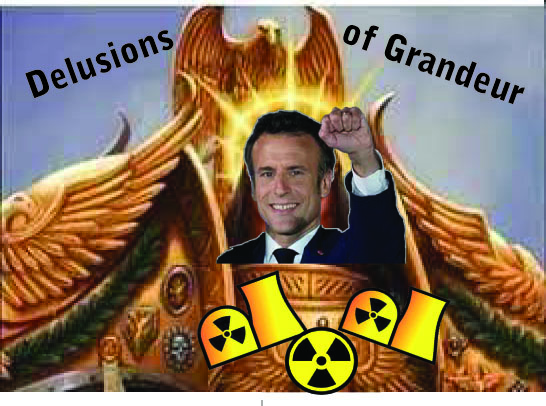France wants to extend its nuclear umbrella to Europe. But is Macron ready to trade Paris for Helsinki?

Bulletin By Carine Guerout, Jason Moyer | May 10, 2024
Europe’s reliance on US nuclear weapons has been at the heart of the transatlantic security relationship, and so has been the protection that the old continent gets from being part of the NATO alliance and its powerful Article 5. Now, the debate about nuclear deterrence for the European Union is back at the forefront, in part due to the prospects of a reticent United States under a possible second Trump presidency and a resurgent Russia increasingly threatening to use nuclear weapons.
NATO, as a nuclear alliance, relies heavily on US nuclear warheads stationed in Europe for its deterrence. The United Kingdom and France are Europe’s only nuclear powers: Although part of NATO, they maintain independent control over their own nuclear arsenals. In the past, the European Union has been reluctant—or incapable—of providing nuclear deterrence. But the uncertain security environment in Europe has recently led the Union to strengthen its previously neglected security pillar—and, with it, caused some political leaders to become more vocal about nuclear weapons.
In recent weeks, France’s President Emmanuel Macron, in his classic disrupting style, has openly called for debate in Europe over using his country’s nuclear capabilities to defend the continent. In Macron’s view the uncertainty over future US engagement in Europe is forcing the European Union to decide whether it needs a nuclear deterrent of its own—and suggests France may help with this. But it is not clear whether France would be willing—and capable—of extending its nuclear umbrella to the rest of the Union. For this to happen, France would need to address multiple issues, starting with explaining whether it would retain full decision-making over its arsenal, exploring the limitations of its current stockpile of nuclear weapons, and weighing the impact such a decision would have on NATO and its relations with the United States and its fellow EU member states.
Macron’s insistence. Since the United Kingdom’s withdrawal from the European Union in 2020‚—popularly known as “Brexit”—France has become the Union’s only country with nuclear weapons. France possesses approximately 290 nuclear weapons (the world’s fourth arsenal in terms of stockpiles warheads behind Russia, the United States, and China). Ever since French President Charles de Gaulle’s famous questioning of US nuclear assurances in 1961— which led France to develop its own nuclear deterrence force—France has historically seen itself as an independent force counterbalancing that of the United States in Europe. This spirit persists today: France still does not participate in NATO’s Nuclear Planning Group and remains one of the Western allies most in favor of nuclear deterrence. France’s independent deterrence strengthens NATO overall because it complicates the calculus of adversaries. Although nuclear deterrence has been a cornerstone of NATO’s deterrence posture, the same cannot be said of the European Union: Many member states remain uncertain about the role of nuclear weapons in defense planning.
The debate over the nuclear readiness of the EU is not new. Traditionally, the holdout to developing a so-called “Eurobomb” has been Germany. In recent years, a growing number of German policy makers have asked the previously unthinkable question of whether it should possess its own nuclear weapons. The German public remains unconvinced, however: Even after the Russian invasion of Ukraine, 90 percent of Germans still reject the idea of their country developing a nuclear weapons program and it seems unlikely the German public will dramatically pivot toward a Eurobomb. Traditionally neutral EU countries such as Ireland, Malta, and Austria are not likely to be willing to support the bomb either: All three are signatories to the Treaty on the Prohibition of Nuclear Weapons (TPNW), also known as the ban treaty, and would likely block any attempt to extend France’s nuclear arsenal to Europe…………………………………………………………………………………………..
Easier said than done. To move forward with his proposal, President Macron will need to answer at least three critical questions about the politics and logistics of a European-level nuclear weapon sharing arrangement. First, France will need to clarify whether it wants to retain full decision-making power over its nuclear arsenal. ……………………………………..
Second, it is not clear how France could realistically provide nuclear deterrence to the entire Union. French nuclear forces have limited capabilities, with a much smaller and less diversified arsenal than that of other major nuclear powers, and its nuclear deterrence has been developed for a strictly defensive purpose. France partially disarmed its nuclear arsenal in the 1990s after the Cold War, reducing its nuclear stockpiles from 600 warheads to just under 300……………………………………………………………
In practice, the idea of a French nuclear umbrella for Europe also raises a third question for Macron: How to embed the French nuclear armament into existing European structures and how this shift would complement NATO’s capabilities in Europe……………………………………………………………………. https://thebulletin.org/2024/05/france-wants-to-extend-its-nuclear-umbrella-to-europe-but-is-macron-ready-to-trade-paris-for-helsinki/
No comments yet.
-
Archives
- December 2025 (249)
- November 2025 (359)
- October 2025 (377)
- September 2025 (258)
- August 2025 (319)
- July 2025 (230)
- June 2025 (348)
- May 2025 (261)
- April 2025 (305)
- March 2025 (319)
- February 2025 (234)
- January 2025 (250)
-
Categories
- 1
- 1 NUCLEAR ISSUES
- business and costs
- climate change
- culture and arts
- ENERGY
- environment
- health
- history
- indigenous issues
- Legal
- marketing of nuclear
- media
- opposition to nuclear
- PERSONAL STORIES
- politics
- politics international
- Religion and ethics
- safety
- secrets,lies and civil liberties
- spinbuster
- technology
- Uranium
- wastes
- weapons and war
- Women
- 2 WORLD
- ACTION
- AFRICA
- Atrocities
- AUSTRALIA
- Christina's notes
- Christina's themes
- culture and arts
- Events
- Fuk 2022
- Fuk 2023
- Fukushima 2017
- Fukushima 2018
- fukushima 2019
- Fukushima 2020
- Fukushima 2021
- general
- global warming
- Humour (God we need it)
- Nuclear
- RARE EARTHS
- Reference
- resources – print
- Resources -audiovicual
- Weekly Newsletter
- World
- World Nuclear
- YouTube
-
RSS
Entries RSS
Comments RSS


Leave a comment